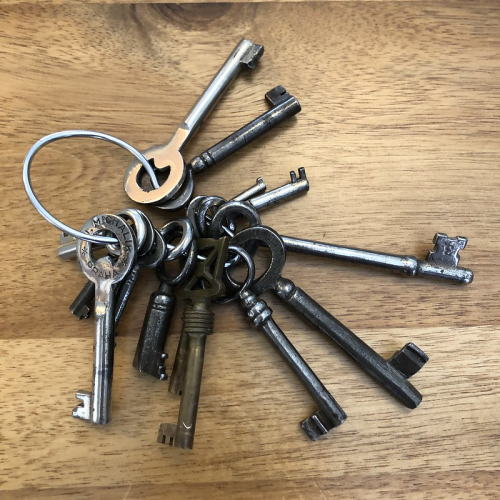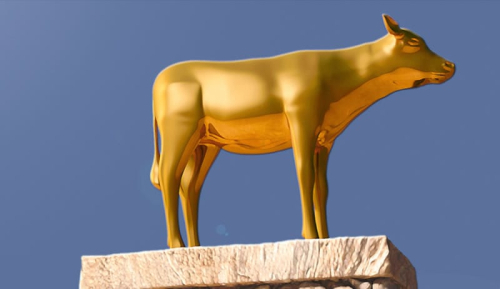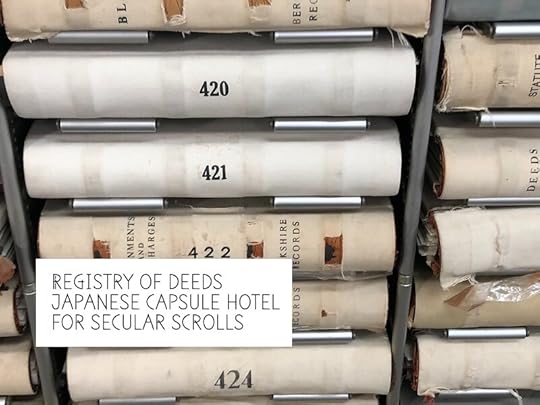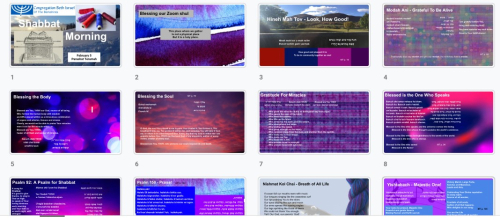Rachel Barenblat's Blog, page 29
March 1, 2022
Keys
Old barrel keys are heavy in the hand. Most have a round or oval bow, though two brassy ones sport criss-cross shapes instead. All have rounded shafts, pin holes of varying diameter, and idiosyncratic teeth. Shaped entirely unlike the keys I can get copied for a buck-fifty at the local hardware store. One is stamped J. MICHALIK PRAHA. Did that key travel with my mother and her parents in 1939? So did the sideboard where I keep china, the one with a cabinet to which I long ago lost the key. I try every key twice, but the Czech cabinet remains locked. Maybe it's better that way. I know it contains the silver goblet from my wedding, a marriage long ago undone. No one gets to know what else might be inside.
February 25, 2022
Trail
On your third yahrzeit
I said kaddish
riding on a speckled roan
surrounded by live oak
and prickly pear.
My horse was first in line.
I wanted to watch my son ride
but maybe this was right --
aren't I still
following you?
That morning
Dad asked where you are
three times.
Each time I answered
I watched him lose you again.
Magnified and sanctified,
I whispered in Aramaic.
My horse's ears twitched.
The mourning doves
murmured amen.
On my mother's third death-anniversary (on the Jewish calendar) I was in Texas with my son, visiting my father who is receiving hospice care. I wanted my son to have some sweet memories of this trip alongside the hard ones, so I looked for a place where we could go on a trail ride, somewhere not too far from town. I commend West Creek Trail Rides to you; all of their horses are rescues, and they're lovely.
While the mishna teaches that one should dismount from a donkey before praying, the sages of the Talmud do permit praying while riding so long as one can pray with kavanah, intention and attention. (Brakhot 30a.) They were talking about the Amidah, but I think the teaching applies. And I know my mother would have been tickled by my unusual location for saying kaddish and remembering her.
If this poem speaks to you, you might find meaning in Crossing the Sea, published by Phoenicia -- poems chronicling my mother's death and my first eleven months of mourning.
February 18, 2022
The wilderness of not knowing: Ki Tisa 5782
In recent weeks we've been reading Torah's instructions for the mishkan, the sacred space that we build so God's presence may dwell in us. Soon we'll start reading about the actual building thereof. But in between the blueprints and the construction, in this week's Torah portion, there's another story.
"When the people saw that Moses was so long in coming down from the mountain, the people gathered against Aaron and said to him, 'Come, make us a god who shall go before us, for that fellow Moses -- the man who brought us from the land of Egypt -- we do not know what has happened to him..." (Ex. 32:1)
This year I'm noticing a new emotional valance. Moses went up the mountain, and they probably expected him to come right back down. But he didn't. And the path ahead began to seem uncertain. Maybe they felt like life was on pause, or felt uncertain when they would start moving again.
Instead of that nebulous uncertainty, they wanted something tangible. Don't tell us you don't know how long it will be: we want to get back to normal now. Just make something up so we can feel normal now, because the not-knowing and the waiting are psychologically and spiritually uncomfortable!
I think we know that feeling. And if that's sometimes true for us, how much more true it must have been for our spiritual ancestors emerging from slavery? Not knowing can be terrifying, especially for someone unaccustomed to freedom. They were like children: seeking easy answers, resisting growing up.
The thing is, there's holiness in the not-knowing. There's holiness in opening ourselves to the uncertainties of wilderness. It's no coincidence that our ancestors hear God's voice most clearly in the wilderness. The midbar (wilderness) is where God m'daber (speaks) -- or at least, where we hear.
Right now I'm in a different kind of midbar, a different kind of wilderness waiting. Some of you know that my father, who is eighty-seven, has been in and out of the hospital this winter with COVID and then post-COVID complications. He's now receiving hospice care. The end of his journey is beginning.
And we don't know when the end will be. The weight of that not-knowing is tremendous sometimes. There's a temptation to lurch toward certainties, to clutch at "answers" that aren't really answers. To think: what can we throw at this to yield a nice, satisfying answer that will get us back to normal?
But there is no "back to normal" when someone is dying. I can't go back to the years when he was vital and vibrant, because this is a new part of his journey now -- and mine. So I'm in the wilderness. It's not comfortable, sitting with mortality. I empathize with the Children of Israel making that calf.
And I know that this wilderness has something to teach me, if I can quiet my racing thoughts and anxious heart in order to learn. This is my own wilderness -- mine, and my family's. And... soon we will reach one million COVID deaths in the United States. There are a lot of us in this wilderness.
This week's Torah portion reminds me that it's tempting to clutch at whatever we think will make us feel better. Anything to push away this not-knowing, whether the uncertainty is personal (like my father's trajectory) or communal (like COVID). Not knowing what comes next (or when) is uncomfortable.
Today's golden calves are a bit subtler than the literal statue in Torah. Maybe we focus on denial of death, or on our outrage about the latest horrific headlines. Either way, we become like the guy in the Zen parable about the teacup: keeping our cup so artificially full that no wisdom can pour in.
This Shabbes, let's take time to be with the not-knowing. We don't know when death will come: that's not just true for my dad in hospice. We don't know when the pandemic will recede. We don't know when Moses will come back down the mountain. Let's open our hearts, and let the not-knowing in.
This is my d'varling from Kabbalat Shabbat services at Congregation Beth Israel of the Berkshires. (Cross-posted to my new From the Rabbi blog at CBI's new website.)
February 17, 2022
Through
"You're home from the hospital," we prompt
our father, back in assisted living.
"No I'm not," he insists. "This isn't home."
I wonder which house he's remembering.
He thinks he's somewhere temporary.
In the end, does the body feel
as extraneous as the oxygen tank
he keeps forgetting he's tethered to?
But there's country music at happy hour
and he tells himself stories
that turn his nurses into old friends.
He knows he's somewhere temporary.
A mezuzah gleams on the final door.
We don't know when he'll go through.
February 11, 2022
Registry
A haiku inspired by a visit to Adams. (The text on the image reads: Registry of deeds / Japanese capsule hotel / for secular scrolls.)
February 5, 2022
The Gifts - video
One of the best things about sharing creativity online is when other creative folks make something beautiful and new, arising out of / inspired by / in conversation with something that I created.
Like this right here, created by two longtime blogfriends:
The Gifts from Allan Hollander on Vimeo.
The audio recording is by Allan Hollander, and the animation is by Alison Kent.
The poem was originally published in my first book-length collection of poetry, 70 faces: Torah poems (Phoenicia, 2011). If you don't have a copy, I hope you'll consider picking one up wherever fine books are sold.
Four gifts
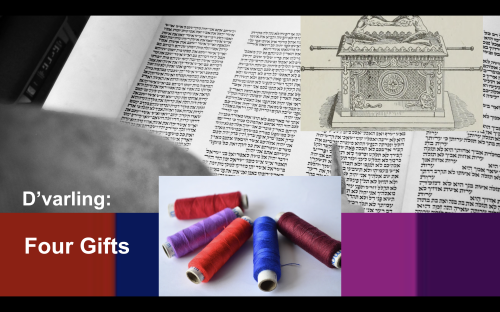
This week's Torah portion contains one of my favorite verses: "Let them make Me a sanctuary, that I might dwell among them." The Hebrew could also mean "within them." We build God a sanctuary so that God -- holiness, love, justice -- can dwell within us.
This year, I'm struck by the colors and the textures. Acacia wood covered over with hammered gold. Fine linen. Goat hair. Blue and purple and crimson, blue and purple and crimson, blue and purple and crimson. (Perhaps you've noticed those colors in this morning's slides!)
A glimpse of this morning's slide deck.
I can almost feel the homespun cloth between my fingers, and the contrast with the fine linen. And my eyes crave the vibrancy. Picture the shining metals and acacia wood. The rich colors of blue and purple and crimson -- in modern language, they "pop."
I was talking with someone from the congregation this week who observed that it feels like we've collectively lost access to something we really need. We've lost spontaneity, or fun, or joy. Everything feels uphill, and joy feels out of reach. I hear that a lot, these days.
896,000 Americans have died from COVID so far. We lost 405,399 in World War II. We lost 58,000 in Vietnam. The number of COVID deaths thus far is so much higher, I can't begin to process it. And that's just here. Unlike any war, this virus is everywhere.
Dayenu, that would be enough! and then there's school boards banning Holocaust books, and a caravan of angry people taking over downtown Ottawa, and -- it's a lot. It's really and truly a lot. What tools can this Torah portion full of ancient blueprints give us for that?!
I found four. Here they are.
1. Beauty in the wilderness
At this moment in our story, our ancestors are arguably traumatized. They went from slavery and hard labor and constricted spirit, to wandering in the wilderness with no clear sense for what's next. They're probably exhausted, maybe afraid, and ready to be done.
Exhausted, maybe afraid, and ready to be done -- does that ring a bell? And that's exactly when God says: bring the gifts of your heart, everyone who is so moved. Bring wood and precious metals, bring the most vividly-colored yarn and fabric, and make beauty.
Our hearts and souls and spirits need beauty, even in the wilderness -- or maybe especially in the wilderness. It may be tempting to say that art and beauty, vibrant colors and music, sacred spaces of all kinds are a luxury. Torah teaches otherwise.
2. Sanctuary
Think about the meaning of the English word sanctuary. As in, "give me sanctuary!" To me it evokes a safe place, a sacred space, a place where no one can hurt me. A place where I can flee from all of life's troubles. Where I'm safe, and can feel hopeful, and be at peace.
Wow, I yearn for that right now. I'll bet some of you do too. A place of safety and holiness and dignity, a place where nothing and no one will do us harm, a place where we can lay down our load and be at peace and maybe even feel joy. Like a vacation, but deeper and more real.
We need that, just as our ancient ancestors did. And the only way to build it is together. To build a mishkan (from the root ������, as in Shechinah, divine Presence) -- to build a place where God can dwell -- requires all of us... and that safe holy place is for everyone.
3. Use what we've got
Like our spiritual ancestors, we can use what we have to connect with holiness wherever we are. They had acacia and gold, blue and purple and crimson yarn. Maybe right now, for us, it's a special tablecloth, or a hand-knitted sweater, or a cherished recipe: all tools for holiness.
Shabbat can be a sanctuary -- a day set-apart from the turmoil of the week. Music can be a sanctuary. For me, lately, that's meant singing along with the Encanto soundtrack! When I'm singing, I am lifted out of where I've been. A contemplative cup of tea can be a sanctuary.
Right now, between pandemic and February ice storms, we may feel stuck. But wherever we are can be a holy place, because God goes with us in all of our wanderings. That's why the Ark of the Covenant had gold rings in the side, and gold-covered poles always in the rings.
4. Bringing our gifts
And when COVID numbers go down and we gather onsite again, we will bring our gifts to community. That's what the name of this week's Torah portion means: t'rumah, the freewill gifts of the heart. The mishkan was built because everyone was moved to help build it.
What kind of holy community do we want to build together when the snows melt, when the voice of the red-winged blackbird is heard again in the willow tree behind our shul? And what can each of us bring? Because building community is like Stone Soup. It needs all of us.
The mishkan isn't a building, as beautiful as our building is. The mishkan is community -- the way we uplift and take care of each other, learn with each other, pray with each other, do mitzvot with each other. That's how we make a mishkan where holiness really dwells.
This is my d'varling from Shabbat morning services at Congregation Beth Israel of the Berkshires. (Check out our spiffy new website!) Cross-posted to the new From the Rabbi blog there.
February 1, 2022
First of February
I���m driving south past rock faces
where springs seep in summer
fixed now in ice, unmoving, opaque.
Snowy hilltops pink
with morning light, but
route seven curves in shadow
striated with sudden sun
where the hills gap
and let light through
like your memories
of mom, of me, of where you are --
here, and then gone.
January 26, 2022
Making it new
"Make it new!" It's been over 20 years since I got my MFA, but that command still resounds. I remember learning it from Liam Rector, of blessed memory, then the director of the Bennington Writing Seminars. Liam was big and brash and often urged us to "make it new," though the thing he said most often was "Always Be Closing" -- words that took on new resonance after his suicide.
"Make it new" comes from Ezra Pound, or so I learned at the time. It turns out those words are quite a bit older, and I'm glad to know they originate with Ch'eng T'ang, since Pound turns out to be a fascist and an antisemite. The poets to whom I most frequently turn are masters of taking the familiar and making it new. Naomi Nye, Jane Kenyon, Mary Oliver: they make it look easy.
This requires both noticing (like Moses at the burning bush) and craft. I want to do what they do. I want to weave something luminous and lasting out of the threads of daily life, like the cloak of mitzvot the Zohar says the righteous will wear in the world to come. But sometimes I sit down at my loom, as it were, and the threads break in my hands. This week is one of those times.
My father's been in the hospital with COVID. I've been bracing for a death that has miraculously not come. (The miracle is the vaccines; his doctors said so repeatedly, as though we needed convincing.) It's not clear what "recovery" will mean, but I'm not racing to Texas for a funeral. A week ago, I was sure I would be. Finally I can exhale. But I don't seem to have poems in me now about that.
I don't have poems in me now about the terrorist attack at the synagogue outside of Fort Worth, or about how it's rippling into Jewish community life. I don't have poems in me about what it feels like to sit with my community and talk about what we would do if. Someone can probably make great poems out of balancing spiritual vulnerability with a panic button, but not me, not now.
I don't have poems in me about the spike of adrenaline every time my child has a symptom, or I have a symptom, or a loved one has a symptom, after two years of pandemic. I don't have poems in me about the constant sense of living in Schr��dinger's box: is that an ordinary virus or is it COVID? Should I use one of our few at-home tests to find out? If I use a test, can I trust the results?
How can I make any of this new? This is everyone's constant companion. Maybe all I can do today is name it. It begins to seem likely that COVID-19, like antisemitism, will never go away. (As I read in Nature, "endemic" doesn't mean "over.") Maybe we will adjust to seasons of relative safety and togetherness, and seasons of relative isolation: both as Jews, and as human beings.
Today the sky is blue. The squirrels have broken the bird feeder and climbed inside, scattering seeds for the mourning doves. Under the snow marked with animal tracks, I know that there is a garden in hibernation. I know that today's realities are not forever. The Jewish spiritual calendar, like the seasonal calendar, draws my eyes toward the horizon. Even now, I live in hope.
January 21, 2022
One heart: reading Yitro after Colleyville
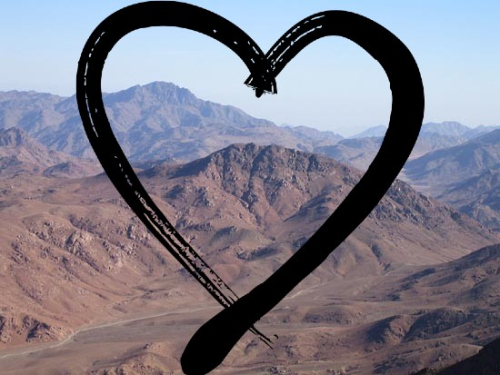
In this week's Torah portion, Yitro, we receive Torah at Sinai. Tradition teaches that every Jewish soul that ever was and ever will be was present at Sinai. At Sinai we stood together as one.
This week some of you have told me that you feel more connected than usual to Jews in other places... especially the Jews of Congregation Beth Israel in Colleyville, Texas. That their shul shares our name heightens our sense of closeness.
Last Shabbat while members and the rabbi of that CBI community were held hostage, our hearts were in our throats and our prayers flowed without ceasing. Often a crisis makes us aware of the interconnectedness we usually don't see. In a crisis, it's easy to feel how what happens to one heart tugs at another heart, bound up as we are in what Dr. King called that "inescapable network of mutuality."
What happens to you impacts me. What happens there impacts us here. That's one of the continuing lessons of the pandemic. And this week, our connectedness means that many of us share a feeling of renewed vulnerability.
But we're connected not only because of our shared vulnerability, our shared fears of antisemitism and attack. We're connected because our souls stood together at Sinai. We're connected through mitzvot. In Aramaic, Hebrew's closest sister tongue, the word for connection is tzavta, which shares a root with mitzvah. The mitzvot connect us with God and with each other.
Some of those mitzvot are listed in this week's Torah portion. Be in relationship with the Force of Liberation bringing us forth from life's narrow places. Resist the urge to worship things that are not God, like statues or status. Remember the day of Shabbat and keep it holy, because when we pause our constant making and doing we are re-ensouled.
And some of the mitzvot our tradition holds dear aren't in today's list, because our tradition is comprised of 613 commandments, not just 10. For instance, the mitzvah repeated thirty-six times in Torah, instructing us in no uncertain terms to "Love the stranger, for you were strangers in the land of Egypt." The rabbi at CBI Colleyville lived out that mitzvah when he invited an unknown man in on a twenty-degree morning and made him a cup of tea to help him get warm. We all know now how that turned out. And: I still think he was right to do it. Welcoming that stranger was the Jewish thing to do.
How do we do that in a way that keeps us safe as a community? That's a big conversation, and it's one we'll be having for a while. There's no simple answer to balancing the Jewish value of pikuach nefesh (protecting or preserving life) with the Jewish value of hachnasat orchim (welcoming others in hospitality). It's another version of the core spiritual balancing act to which our tradition calls us, between gevurah and chesed -- boundaries and lovingkindness.
It's okay to feel afraid. It would be spiritually dishonest to pretend otherwise. When someone chooses to join the Jewish people, at the end of their beit din and just before immersion there's a ritualized series of questions rooted in Talmud that I ask. They're questions like: don't you know that it's sometimes hard to be Jewish? Don't you know that being Jewish comes with obligations, and yeah, it also comes with antisemitism that will now be aimed at you?
But today I want to add: don't you know that being Jewish is also joyous? Lighting Shabbat candles and letting the week's worries slough away -- telling our core story of liberation at the seder with songs and laughter -- the heart-opening and mind-expanding journey of Jewish learning -- feeding the hungry and clothing the naked and caring for the powerless -- there's so much beauty and meaning here.
All of these connect us with our cousins in Colleyville, and Squirrel Hill, and Poway, and all over the world. Antisemitism is real and it's frightening and it probably isn't ever going away. But the mitzvot, and our Jewish joy -- they can't take that away from us.
The commentator Rashi notes that when Torah describes our encampment at Sinai, it uses a singular verb to teach us that when we gathered at the base of that mountain we were like one being with one heart. We get another hint toward this a few verses later, where we read that the whole community answers ������������������ / yachdav, as one.
It's easy to focus on all the things that divide us: different Jewish denominations, different ways of doing Jewish, different dress codes, different relationships with mitzvot or God or spiritual practice. But at Sinai we had a shared heart. And during last weekend's crisis we felt our shared heart. May the shared heart that we felt while our cousins in Colleyville were in danger stay real for us, long after that danger is gone. And may that shared heart connect and sustain us through whatever comes.
This is the d'varling that R. Rachel offered at Kabbalat Shabbat services this week (cross-posted to CBI's From the Rabbi blog.)
Rachel Barenblat's Blog
- Rachel Barenblat's profile
- 6 followers


